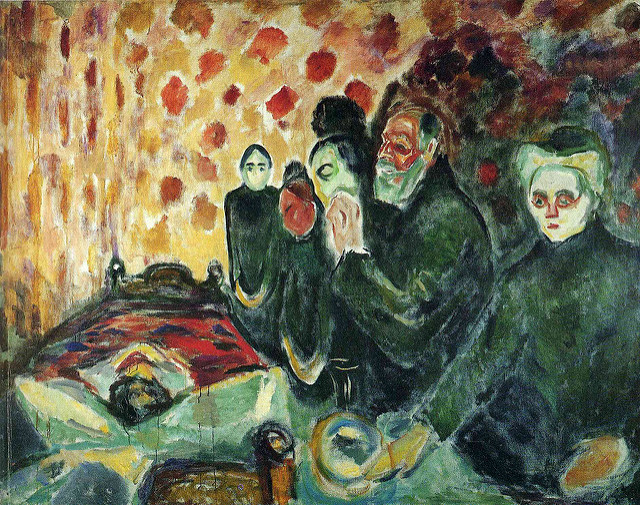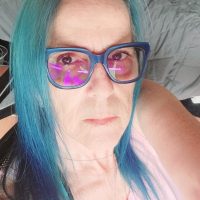My mother’s dying.
And in just her way—steadfastly. Her hallmark strength turns out, in the end, to anchor not release her body. That body hangs now, like soaked, flannel pajamas. Skin and bones, the cliché aptly describes my mother’s withered frame.
At night, I dream her plump and gap-toothed, the way she danced my childhood from shoelaces to my first-born’s birth.
She’s a flash of her toothless smile now. Her emaciated frame amazes me with its stubbornness to give in or out, as it twitches and bolts to imaginary spaces.
Where are you off to, Mom?
We die like clockwork.
Hospice nurses give pamphlets to families of cancer patients. With near pinpoint accuracy, the pages predict how and when your mother, father, sister, brother, child, and friend will die—almost to the day. How a human crawls up inside herself when it’s time to go. We get morphine in the end to make it bearable.
My fireman brother remarked, “Doctors can predict pretty accurately at the time of diagnosis when a cancer patient will die, but they can’t cure or treat the disease.”
It takes too long to die. Bodies that crumble and crack in car crashes bleed life swiftly at the broken shards’ tender slices. Yet still, they often survive. For some, the body won’t surrender easily.
She’d say, “I’m not stubborn; I’m tenacious.” She loved words. I see her sitting in bed at night solving crossword puzzles.
Petrified friends and family wince at her body’s shocking, emaciated intractability, forgetting the woman beneath those bones. She’s an eighth of herself now.
Sitting at the kitchen table under the slow-turning ceiling fan, I watch her then lucid, sliver-hazel eyes brim. College math nearly defeated her when she returned to college 30 years after she should have finished to earn her degree.
Like stringed marionettes, we’re bodies suspended in gravity.
I could damn those bones, the pumping heart, and the breath that battles ambivalently to take or leave her today, tonight, or tomorrow. I could mourn the glittering vibrancy her cruel, venomous cells stole from her. Most days I do.
But today, my yoga practice showed me. As my body effortlessly leapt from upright, prone, slanted, arced, and folded, I marveled that it could move at all. The body. How does this sack of bloody bits and pieces sail through asana, buoyed like floating oil upon still water?
I lived 3,000 miles across the country when she flew through the window of a 1976 Chevy Astro van 35 years ago, a bird in endless flight with only the highway embankment to stop her.
We war or play with gravity, until forced to lay down our weapons, mere toys after all.
We’re not done yet, her body and mine. It took me six years of patience to drift two taut legs up into the air in headstand. She emerged from a neglectful mother’s baby to a 65-year-old Master of Arts recipient.
I read all 104 pages. Her proud words and trademark expressions irritated me. She never took things seriously enough. Not like I do. Did she know then she’d be writing for her life? Her greatest academic achievement merely whispered the stillness in chaos of Saul Bellows’ writings.
She whispers still—in palsied, husky groans more poignant than a clever graduate student’s thesis. Crooked half-grins cast pale shadows of the raucous laughter she often let loose. Today those smiles mock death.
But more than her smile, her words live in me. It’s her voice inside them I miss. She hasn’t spoken in years. Dementia often swallows language first. Murderer!
Death reminds us.
When I’m not her—terrified by the harrowing suffering, I imagine—I observe her, a body. Only then, I can admire her, even envy the magnitude of her labor and the significance of her persistence. I want to know. I don’t want to be her. I don’t want to suffer or die. But I want to know what she now knows.
The philosopher says death forces us to authenticity—but only our own death, not others’. Its grim face awakens us from our daily sleepwalk. We must keep it close so that we remember life ends. We have no time to waste. It warns: Be yourself, or in the end, lose both your real and potential self.
We’re not our biographical facts but the sounds, sights, and smells in our stories. We’re the recalled sensation of a cool hand placed upon our fevered brows.
I sneak in, late again. The chattering clicks of my mother’s aluminum knitting needles chide me as she—unfazed—knits idly on the sofa amid squawking children, police sirens, and howling dogs.
Breath is everything now. I hear its hoarse wheeze, even off the mat. I locate the inhale from deep below the diaphragm and follow its fluted, esophageal path up through the nose. I imagine the invisible particles that trail along released carbon-dioxide.
Death breathes us.
My brother, three sisters, and I sat at the kitchen table the other night debating my father’s wishes to cremate her. Two sisters claim she never wanted that. I’m ambivalent.
Ashes to ashes, dust to dust, earth is our mother, and we all return to the ionic particles from which we arose.
Her job here is done either way. We’ll breathe her cast-off cells and carry her genes a little while longer before my daughters take up the mantle.
The oxygen tank’s grumbling hum permeates the house, reminding us to breathe. Every morning I check her chest’s rise and fall. I will sink to my knees the day I see her open-mouthed, frozen cry to the sky. Until her stillness eventually quiets me. At least I picture it that way—looking at death in her eyes and thanking it for letting me see her through.
Not life but death is the baton we pass on to the next runner. Immortality is a dreadful nightmare—endless life eking out to no end. Without urgency, what inspires us to write poetry or seek life on Mars? Time and breath is all. Death is who we are.
And it’s as ghastly and splendid as my mother’s porcelain, sunken face, eclipsing her last days.
~
~
~
Author: Pamela Gerber
Image: Flickr/Timothy Armstrong
Editor: Travis May


 Share on bsky
Share on bsky





Read 0 comments and reply